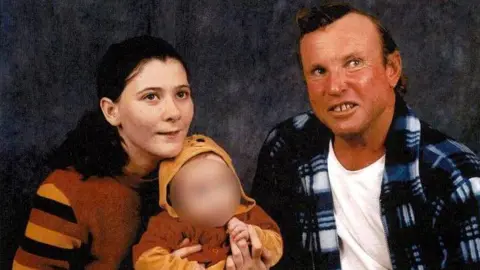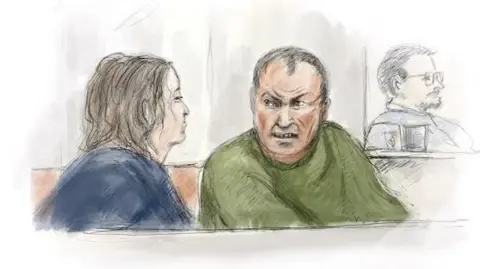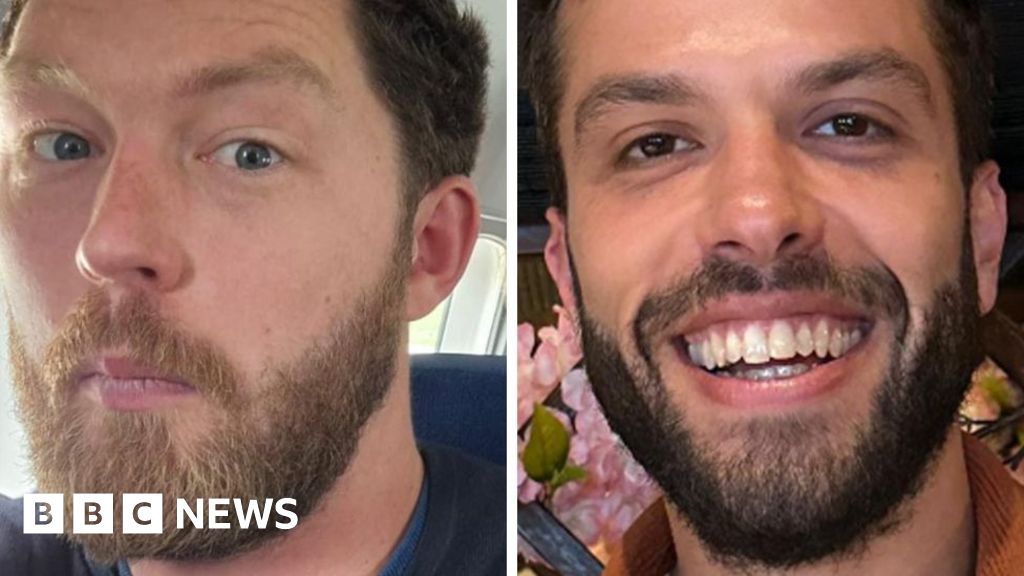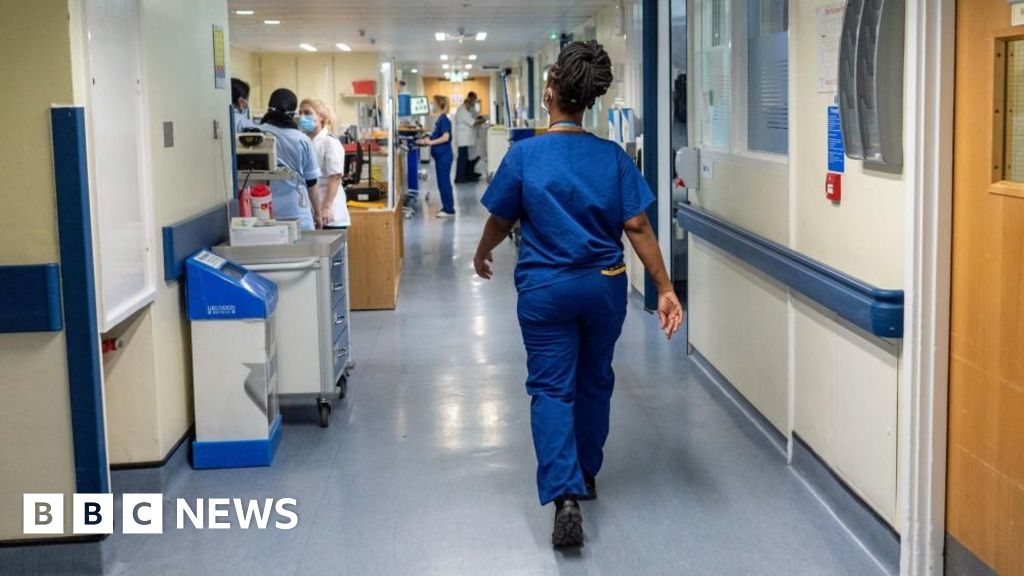
 Supreme Court of New South Wales
Supreme Court of New South Wales
The defence argued that Robert Geeves' violent past had "blinded" those investigating Amber's disappearance
On a cold winter’s day in June 2002, an intellectually disabled teenage girl disappeared from the New South Wales Riverina without a trace.
Since then, the mystery of what happened to Amber Haigh has captivated the vast Australian farming region, due to a stunning allegation: that the 19-year-old was killed by the father of her five-month-old baby and his wife, so that they could take her child.
Two decades on, Robert and Anne Geeves - both 64 - were charged with her murder, but on Monday were acquitted after a high-profile trial.
Justice Julia Lonergan found that prosecutors had failed to prove their alleged motive, saying: "Cases are not decided on rumour, speculation or suspicion."
The Geeveses are the last known people to have seen Amber alive. They have long said they dropped her at a train station 300km (186 miles) from their home in Kingsvale - where the three had been living at the time - so that she could visit her dying father on 5 June.
Despite extensive police investigations, a coronial inquiry, and a million-dollar reward for information, her body has never been found.
Prosecutors relied on witness testimony and hundreds of documents to support their theory - that the Geeveses had “manipulated” Amber into having Robert’s baby, and then “removed” her “from the equation” when she wouldn’t relinquish custody.
The court heard the couple had an adult son - who had previously dated Amber - but in the early 2000s still “desperately” wanted another child, having endured several miscarriages and a stillbirth.
However, the defence said the allegation they killed Amber to steal her baby was baseless, and that the investigation into the pair - who have spent two years in prison awaiting trial - was flawed from the start.
They told the court a “haze of mistrust” had clouded the local community’s view of the Geeveses due to Robert’s history - which included acquittals for the murder of an ex-partner who was found shot in the face on his property, and sexual assault charges involving two schoolgirls.
That past, the Geeveses' lawyers said, had created a “presumption of guilt” that persisted for decades, and ultimately “blinded” police as they looked for Amber.
Over nine weeks, dozens of witnesses gave evidence about the final months of the teen's life – describing a "kind hearted" yet “vulnerable” young woman who struggled to discern between “love and exploitation”.
Two recalled how Amber had shared stories of abuse with them - including instances where Robert Geeves had allegedly plied her with alcohol, tied her up, and had sex with her.
And the couple’s son Robbie told the court that his mother had referred to his ex-girlfriend as a “surrogate” and that both parents had turned up at his home in the dead of night asking him to accept Amber’s child as his "little brother”.
The prosecution also tendered an agreement Amber made Robert sign, promising not to take her child, as well as a will she’d created stipulating her aunt be given custody of the baby in the event of her death.
"There was little sign, in the sea of evidence in this case, that Amber was ever shown the love she needed or deserved," Justice Lonergan said, adding that it is clear “beyond a reasonable doubt" that she is dead.
But the judge ultimately found a critical “problem” with the prosecution’s case - there was “no satisfactory evidence” that Anne and Robert still held a desire for more children when Amber became pregnant.
She criticised the accounts of prosecution witnesses and said the investigation had focussed on "disproving the Geeveses version of events" rather than investigating the cause of Amber’s disappearance.
Looking at the couple as they sat in the dock, Justice Lonergan ordered that they be released from custody immediately.
One member of the public gallery stormed out of the courtroom to scream. Amber’s relatives, too, were visibly shaken, with some later quietly breaking down in tears outside court.
A teenager ‘looking for love and solace’

 ABC News/Sharon Gordon
ABC News/Sharon Gordon
Robert and Anne Geeves have been in prison since their arrest two years ago
The prosecution and defence agreed on little throughout the trial - other than that Amber’s life had been exceptionally difficult, and that her death came prematurely.
“Amber went back and forth between places and people looking for love and solace. She never found it.
“She was still looking for it when she disappeared,” Justice Lonergan concluded.
The court heard that Amber had come to Kingsvale - an isolated suburb near the regional town of Young - in the 1990s to live with her great aunt Stella Nealon, after fleeing a “dysfunctional” childhood in Sydney marred by epilepsy, learning difficulties, and a violent alcoholic father.
Ms Nealon had lived next door to the Geeveses, who were both in their 40s at the time and were introduced to Amber by their 19-year-old son Robbie.
The court heard that Amber’s life at her great aunt’s house was volatile, and at times physically violent. Much of the tension stemmed from Amber’s relationship with one of her cousins, which had resulted in an abortion at age 14.
In police interviews played to the court, the Geeveses said they had offered Amber refuge and that she had entered a sexual relationship with Robert shortly after.
The Geeveses said that although their relationship with the teen may have seemed “weird” or confronting to outsiders, the three of them “got along very well”, with Anne telling police that Amber saw her as a maternal figure.
When it became clear in 2001 that Amber had fallen pregnant with Robert’s child, it caused a rupture within the local community, and ultimately severed Robbie’s relationship with his parents - an estrangement still apparent in court on Monday.
By all accounts, Amber “adored” her son, but social workers and friends testified that she’d also struggled to keep up with the ceaseless demands of motherhood.
The Geeveses have maintained that they did their best to help Amber navigate those challenges, and that they did so without vested interest.
And in her ruling, Justice Lonergan found “nothing sinister” in their “provision of assistance” for Amber and her child - whose privacy is still subject to strict legal protections.
Further, she said the “consistent” account given by the Geeveses - that they last saw Amber as she walked towards the station after kissing her son goodbye - was not “inherently implausible”.
Listing the details of the case, she noted that while it was clear Amber was “attacked, abused and made to feel unsafe” since childhood, the prosecution had failed to establish how she met her end.
She conceded it is an outcome which leaves some of the “factual matters” in the case - which has tortured so many close to it for decades - unresolved.
 (1).png)
 3 months ago
10
3 months ago
10


















